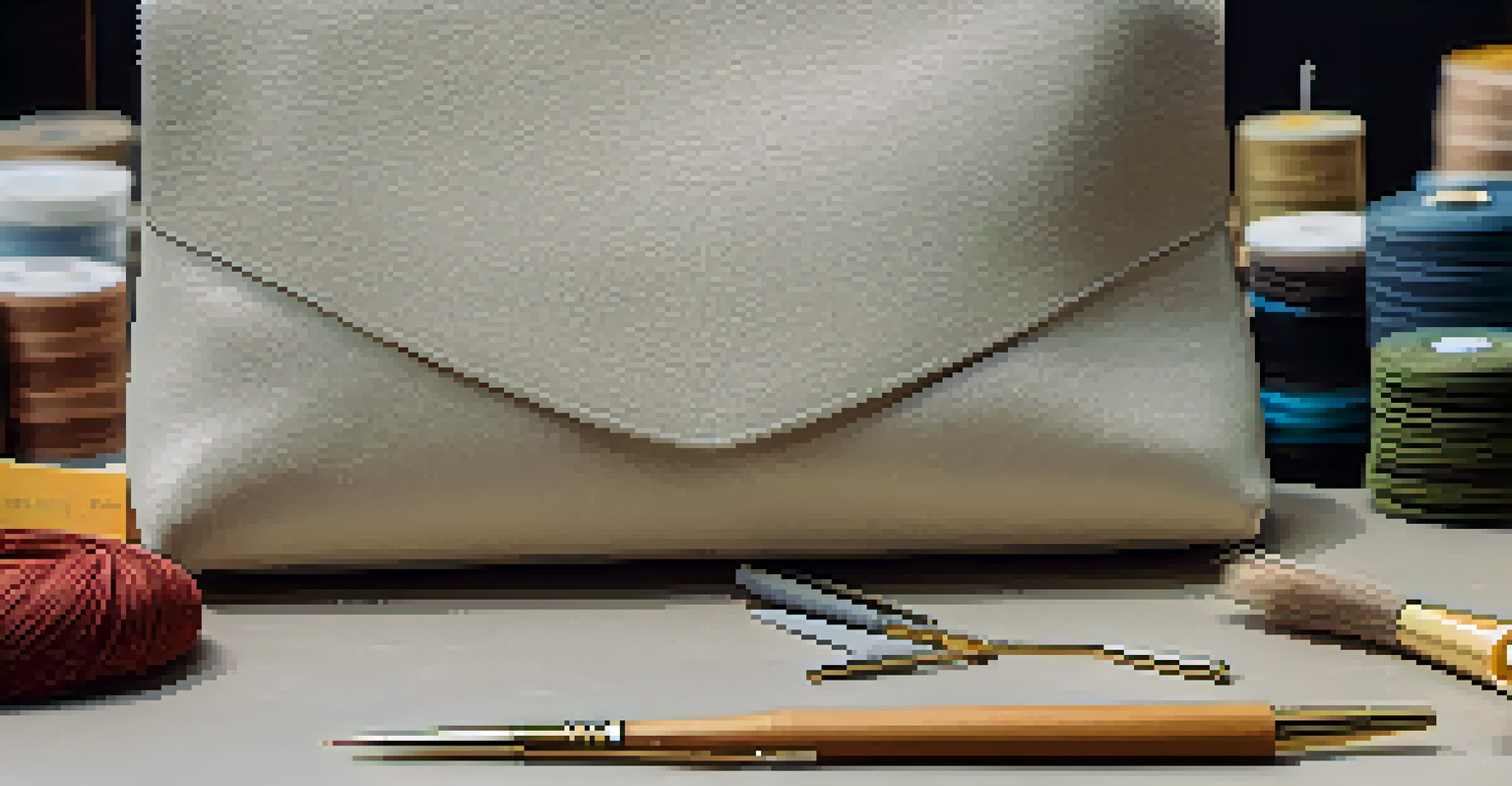The Rise of Vegan Fashion: Ethical Choices for Conscious Consumers

Understanding Vegan Fashion and Its Appeal
Vegan fashion is all about creating stylish clothing and accessories without using animal products. This includes everything from faux leather to plant-based fabrics, appealing to those who want to look good while being kind to animals. As awareness of animal welfare grows, more consumers are seeking alternatives that align with their values.
Fashion is the armor to survive the reality of everyday life.
The appeal of vegan fashion goes beyond just ethics; it also taps into sustainability. Many vegan brands prioritize eco-friendly materials and practices, meaning your fashion choices can contribute to a healthier planet. This dual focus on animal rights and environmental care resonates with a growing demographic of conscious consumers.
Moreover, vegan fashion has evolved to be just as trendy as traditional options. Designers are now crafting innovative pieces that rival the aesthetic of high-end brands, proving that ethical choices can also be stylish. This shift allows consumers to express their individuality and values through their outfits.
The Environmental Impact of Fashion Choices
The fashion industry is one of the largest polluters globally, and traditional materials often contribute to this issue. By opting for vegan fashion, consumers can help mitigate the environmental damage caused by animal agriculture and resource-intensive materials like leather and wool. This choice is a step towards a more sustainable wardrobe.

Vegan materials, such as organic cotton and Tencel, generally have a lower carbon footprint and require less water to produce. By supporting brands that utilize these eco-friendly fabrics, consumers are making a positive impact on the environment. This is particularly important as climate change continues to pose a significant threat to our planet.
Vegan Fashion: Style Meets Ethics
Vegan fashion combines stylish clothing with ethical practices, appealing to consumers who value animal welfare and sustainability.
Additionally, many vegan fashion brands are committed to ethical production practices, ensuring fair wages and safe working conditions for garment workers. This commitment to social responsibility adds another layer of appeal for consumers looking to make choices that resonate with their ethical beliefs.
The Role of Social Media in Vegan Fashion's Growth
Social media platforms have played a pivotal role in the rise of vegan fashion. Influencers and activists use these channels to showcase sustainable and ethical brands, captivating audiences with visually appealing content. This vibrant online community fosters a sense of belonging among those who prioritize conscious consumerism.
The greatest threat to our planet is the belief that someone else will save it.
Hashtags like #VeganFashion and #SustainableStyle have gained traction, making it easier for consumers to discover new brands and share their own fashion choices. This grassroots movement encourages individuals to explore vegan options and engage with like-minded people, amplifying the message of ethical fashion.
Moreover, social media allows brands to tell their stories authentically, connecting with consumers on a personal level. By sharing behind-the-scenes glimpses of their production processes and the values that drive them, these brands foster trust and loyalty, encouraging consumers to make more informed choices.
Innovative Materials Shaping Vegan Fashion
The evolution of vegan fashion is heavily influenced by innovative materials that mimic the look and feel of traditional fabrics. For instance, pineapple leather, made from the fibers of pineapple leaves, offers a sustainable alternative to animal leather while being both stylish and durable. Such innovations are crucial in making vegan fashion more appealing.
Other exciting developments include materials like mushroom leather and recycled plastics, which not only look great but also help reduce waste. As technology advances, the fashion industry is discovering new ways to create high-quality, eco-friendly fabrics that meet consumer demands for both style and ethics.
Social Media Fuels Vegan Fashion
The rise of social media has created a vibrant community that supports and promotes vegan fashion, making it easier for consumers to discover and share ethical brands.
These materials are not just a trend; they represent a shift in how we think about fashion. By embracing alternative textiles, consumers can contribute to a more sustainable future while enjoying the benefits of fashionable, cruelty-free clothing.
Challenges Facing Vegan Fashion Brands
Despite the rising popularity of vegan fashion, brands face several challenges in their quest for success. One major hurdle is the higher production costs associated with sustainable materials and ethical labor practices. These costs often lead to higher retail prices, which can deter some consumers from making the switch.
Additionally, there’s a common misconception that vegan fashion sacrifices style for ethics. Brands must continuously prove that their designs can be just as chic and trendy as traditional options. This misconception can hinder their ability to reach a wider audience and gain mainstream acceptance.
Furthermore, competition in the fashion industry is fierce. With countless brands vying for consumer attention, vegan fashion brands must find innovative marketing strategies to stand out. Establishing a strong brand identity and effectively communicating their values is key to attracting and retaining customers.
Consumer Awareness and the Shift in Mindset
The rise of vegan fashion is closely linked to a broader shift in consumer awareness regarding ethical and sustainable practices. As more people educate themselves about the implications of their purchasing decisions, they are increasingly inclined to support brands that align with their values. This newfound consciousness is transforming shopping habits across the globe.
Documentaries, articles, and social media campaigns have shed light on the environmental and ethical issues related to traditional fashion. This influx of information empowers consumers to make informed choices and encourages them to seek out alternatives that reflect their beliefs. The result is a growing market for vegan and sustainable fashion.
Innovative Materials Transform Fashion
New materials like pineapple and mushroom leather are revolutionizing vegan fashion, providing stylish, sustainable alternatives to traditional fabrics.
This shift in mindset is not just a passing trend; it represents a fundamental change in how we view fashion. Consumers are beginning to prioritize quality over quantity, focusing on timeless pieces that are both stylish and ethical. This conscious approach to fashion is paving the way for a more sustainable future.
The Future of Vegan Fashion: Trends to Watch
As vegan fashion continues to gain traction, several trends are emerging that will shape its future. One notable trend is the increased collaboration between vegan brands and mainstream retailers, making ethical fashion more accessible to a broader audience. This partnership could significantly change how consumers perceive and engage with vegan options.
Another trend is the focus on transparency within the supply chain. Consumers are demanding more information about where their clothing comes from and how it’s made. Brands that prioritize transparency and ethical practices will likely gain a competitive edge in the market, attracting consumers who value accountability.

Lastly, the integration of technology in the fashion industry is expected to play a significant role in the future of vegan fashion. From 3D printing to sustainable production techniques, these innovations can help create more efficient processes and reduce waste. As technology advances, the possibilities for vegan fashion are limitless.